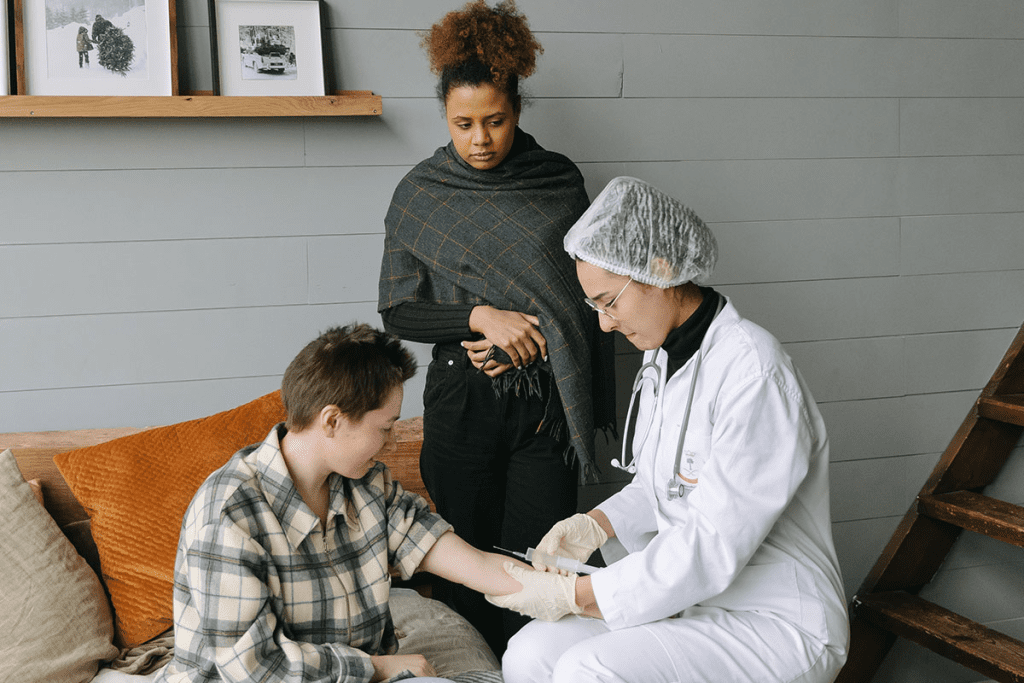Last Updated on November 13, 2025 by
Research has shown that some drinks can raise the risk of culinary cancer. It’s important to understand how these beverages can have carcinogenic effects. This knowledge helps us make healthier choices to reduce our cancer risk.

Some drinks contain carcinogens, which can cause cancer. The link between these drinks and cancer risk is a big worry. Top hospital networks like livhospital.com are working hard to prevent this.
Certain drinks have been linked to an increased risk of cancer. It’s important to understand these connections to prevent cancer. The relationship between drinks and cancer is complex, with many factors playing a role.

Some drinks contain carcinogenic compounds that can lead to cancer. For example, alcoholic drinks raise the risk of liver, breast, and colon cancer. The ethanol in alcoholic beverages turns into acetaldehyde, a known carcinogen.
“The consumption of alcoholic beverages is a significant risk factor for several types of cancer,” research says. Knowing how this risk works is key to preventing cancer.
The ways drinks contribute to cancer are complex. For instance, the acetaldehyde produced during alcohol metabolism can damage DNA, causing cancerous mutations. Some drinks may also have carcinogenic contaminants or be processed in harmful ways.
By understanding these mechanisms, people can make better choices about what they drink. This can help lower their risk of cancer.
Studies have found that drinking alcohol is a major cause of preventable cancers. Alcohol is known to increase the risk of cancer. It’s classified as a known human carcinogen.
Alcohol consumption is a big risk factor for many cancers. It’s important to know how alcohol affects cancer risk. The link between alcohol and cancer is strong. We must understand the role of alcohol in cancer risks.

Alcohol is the third leading cause of preventable cancers in the U.S. It’s linked to a lot of cancer deaths each year. The harmful effects of alcohol come from its metabolites, like acetaldehyde. These substances damage DNA and harm cell function.
Drinking alcohol raises the risk of several cancers, including:
The risk of getting these cancers goes up with more alcohol. Even a little drinking can increase cancer risk. Knowing the alcohol-cancer link helps us make better choices and lower cancer risk.
Research into beer and cancer risk shows important facts for staying healthy. Beer is a popular drink worldwide. Knowing its health effects is key.
Drinking beer regularly can increase cancer risk. The alcohol in beer can harm DNA and cells.
Studies show that heavy beer drinkers face higher risks of liver, colon, and rectal cancer. Other lifestyle choices, like diet and smoking, also play a role.
Craft and commercial beers differ in how they’re made and what’s in them. Craft beers often have more alcohol and unique ingredients that might affect cancer risk.
But, research doesn’t clearly show if craft or commercial beer is riskier. More research is needed to understand the impact of different beers on cancer.
Some studies hint that drinking beer in moderation might have health perks. But these findings are not solid. They should be seen as part of a bigger picture of health and lifestyle.
The link between wine and cancer risk is complex and widely studied. While some see wine as part of a healthy lifestyle, research shows it might have harmful effects. This applies to both red and white wine.
Research has looked into how red and white wine affect cancer risk. Red wine contains antioxidants like resveratrol, which might be beneficial. Yet, the science on its cancer-fighting abilities is not clear-cut.
The alcohol in wine is the main culprit behind increased cancer risk. The carcinogenic effects of alcohol are well-known. Wine, being an alcohol, contributes to this risk.
Even drinking wine in moderation can raise cancer risk. Studies have found that:
When looking at the 5 worst foods for cancer or highest foods that raise cancer risk, alcohol is key. Wine, as a beverage, plays a big role in dietary patterns that affect cancer risk.
Understanding the link between wine and cancer risk helps people make better choices. It shows that even healthy-seeming habits, like drinking wine in moderation, can have complex health effects.
Research shows that spirits and hard liquors with high alcohol content raise cancer risks. This is a big worry for those who drink them often.
Studies link high-alcohol drinks to a higher cancer risk. Spirits and hard liquors are seen as more dangerous because of their alcohol content.
Alcohol is broken down into acetaldehyde, a harmful substance. Drinking a lot of spirits and hard liquors can increase this harmful substance in the body.
Drinking spirits and hard liquors can increase the risk of several cancers, including:
Knowing these risks helps make better choices about drinking. Being aware of the dangers of spirits and hard liquors can help lower cancer risk.
To understand how alcohol can lead to cancer, we need to look at its breakdown products and their impact on DNA. Alcohol is turned into acetaldehyde, a known carcinogen, when we drink it. This is key to understanding how alcohol causes cancer.
Acetaldehyde is a strong DNA-damaging agent that hinders DNA repair in cells. This damage can cause mutations that lead to cancer. Studies show that people with certain genetic changes in alcohol metabolism genes face a higher risk of alcohol-related cancers. This is because they have more acetaldehyde.
Other ways alcohol causes cancer include making reactive oxygen species (ROS), which harm DNA and proteins. It also messes with retinoic acid metabolism and how cells work. Plus, alcohol makes it harder for the body to fix and keep DNA stable, raising cancer risk.
It’s important to understand these processes to know how do you get cancer and what increases the risk. By learning about alcohol’s role in causing cancer, we can make smarter choices about drinking.
The question of what can cause cancer is complex, with many factors involved. Drinking alcohol is a big risk factor, and its effects should not be ignored. By diving into the science of alcohol-related cancer, we can learn how to lower these risks through education and awareness.
Drinks other than alcohol can also raise cancer risk. Alcohol is known to increase cancer risk, but other drinks have links too. This includes a variety of beverages.
Drinking very hot beverages can raise esophageal cancer risk. The high temperature can harm the esophagus. This might lead to cancer over time.
Evidence from research shows a high risk for those who drink very hot drinks often. This habit can cause long-term irritation and inflammation. It increases the risk of esophageal cancer.
Sugar-sweetened drinks are linked to health issues, including cancer risk. The sugar in these drinks can cause obesity and insulin resistance. Both are cancer risk factors.
Research findings suggest a link between these drinks and cancers like pancreatic cancer. They also point to certain gastrointestinal cancers.
To lower cancer risk, cut down on sugar-sweetened drinks. Also, avoid drinking very hot beverages.
It’s important to know how drinks can affect cancer risk. Some drinks, like those with a lot of alcohol, can raise the risk of getting cancer. This shows how our daily choices can impact our health.
Being careful about what we drink can help lower cancer risk. Avoiding alcohol, very hot drinks, and sugary drinks is a good start. Also, some foods and drinks, known as the 5 worst for cancer, can harm our health if we eat or drink too much of them.
Choosing better drinks is a simple way to help prevent cancer. By picking drinks that are safer and knowing which ones might be harmful, we can all help reduce cancer risk.
Carcinogens are substances that can cause cancer. They are found in some drinks, foods, and environments. Knowing about carcinogens helps us understand the cancer risks linked to different beverages.
Drinks with alcohol can lead to cancer. They damage DNA and disrupt cell functions. Drinking too much or too often increases this risk.
Drinking alcohol raises the risk of several cancers. This includes mouth, throat, liver, and breast cancers. Alcohol is a major cause of preventable cancers.
The alcohol content in drinks is more important than the type. Yet, some studies show different risks for beer, wine, and spirits.
Yes, even a little wine can raise cancer risk. The risk depends on the wine type and personal factors.
Research links sugar-sweetened drinks to higher cancer risks. This might be because they contribute to obesity and metabolic problems.
Drinking very hot beverages can increase esophageal cancer risk. This is because the heat damages the esophagus lining.
Avoiding drinks with alcohol or sugar can lower cancer risk. Choosing cooler drinks is a smart step towards preventing cancer.
Studies are looking into the cancer risks of craft versus commercial beer. Some findings suggest differences, but more research is needed.
Acetaldehyde, a byproduct of alcohol, damages DNA. This damage can lead to cancer. It’s a key reason alcohol is linked to cancer.
Subscribe to our e-newsletter to stay informed about the latest innovations in the world of health and exclusive offers!